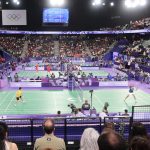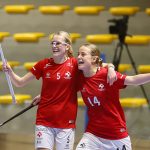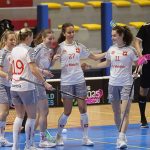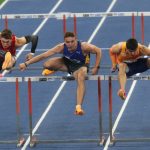The Winter Olympic Games 2022 are finished. I have to say, I am relieved. It may have been the two worst weeks for sports history since 86 years, likely. You would typically see the Flyctory.com alternative medal count in here. Just as I did it for the 2018 Winter Games or Tokyo’s one year delayed Olympic moment in 2021. However, I just did not feel like it. The result would be preliminary anyway, due to the the certified uncertainty of the Figure Skating Team Event – and, likely, some more shifts in the medals to come. I tried to ignore the Games as much as I could. I mainly watched luge, as I love following German Julia Taubitz, and the Olympic Ice Hockey Tournament. That’s mainly it.
Nonetheless, I kept in touch with the Games, read reports, watched some sum-up here and there, so that I always knew what is going on. Far more than enough to have some thoughts about Beijing 2022. And that’s what this sports blogging post is about. Some thoughts about these Olympic Winter Games:
Propaganda and Genocide
The effort to run Olympic Winter Games is massive – especially as there are some facilities you likely won’t need any more right after the two weeks event (e.g. the facilities for speed skating and the bobsleigh / luge / skeleton stuff). Thus, you buy in that you work with people who see more than an economic and infrastructure investment when they bid for the Games. The way the Chinese hosts have presented Uighur athlete Dinigeer Yilamujiang in the Opening Ceremony is disgusting. Thomas Bach lost a lot of reputation the last weeks – but whoever will follow him one day, it is hard to believe things get better.
At least, the next Olympic Games, summer and winter, feel to become better in that relation, but might have other issues. While China could present themselves and do propaganda, it will be interesting to see whether the Olympic Games can recover from Beijing 2022. The more people decide not to watch the Games, the more the IOC gets under pressure due to lower TV and sponsorship revenue. But… these were “just” Winter Games. We will see at Paris 2024 if Beijing left a negative mark in the French books.
The D-Word
Doping is nothing exclusive to the Beijing Games, for sure. However, that an athlete is starting with reservations and one competition is still not yet finalized (Figure Skating Team Event) feels unique. The Valieva case has been a shame for the IOC, the WADA and the Russian Anti-Doping Programs (if there are some). People tend to think that the young Russian figure skater is a victim of her coaches. But you should bear in mind that the actual gold and silver medalist in women figure skating, Anna Shcherbakova and Alexandra Trusova, come from the same training group, have the same coaches. Can we really believe they are clean? If they were, what would that mean in regards of Valieva?
It was likely right to allow her to compete from a formal and legal point of view (and also as the Russians love her and Putin and Bach are that good buddies…). Sports needs to define what kind of sports they want – and be strict in it. Having a country starting under an IOC flag because you believe there is state-organized, systematic doping is not a punishment. It’s ridiculous.
Control The Coaches
Kamila Valieva was the likely been the face of the Olympic Games – a tragedy instead of a masterous performance. At least she may raise some questions. For example, why are there Youth Olympic Games if you compete with the adults at the age of 15? My question rather has been: when is sports controlling the coaches better? It was likely already an absolutely disgraceful decision to sent this kid out to the ice rink for the Free Skating event. Treating her in that way as Russian coach Eteri Tutberidze has not only been a shame for Russian ice skating and the Russian sports – it has been a failure for all sports. Accusations and verbal abuse in this moment of failure would be wrong if Valieva was an adult, but they absolutely unacceptable at this 15-year old girl.
Don’t just blame the Russians here. The coaching failure of Tokyo 2020 was Kim Raisner, coach of the German Modern Pentathlon team and especially of Annika Schleu. We all remember how she failed to handle Saint Boy. I do understand that this is a terrible situation for an athlete, having an almost certain gold medal and then being almost kicked out of the competition by an unfaithful horse assignment. But: these things happened in a couple of Summer Olympics before. I am sure they happen regularly at minor Modern Pentathlon. The ugly the situation is, you need to be prepared for that. To me, the team around Annika Schleu did a terrible job in preparing her for the competition. At least for all major competing countries and all athletes, which may have a chance to go for the medal, coaches need to be better educated and controlled.
Germany and the Bobsleigh Track
The bobsleigh track, ice channel or however you call it is likely the most controversially discussed kind of venue you need for Winter Games. Such an investment, and absolutely useless for the time after the medals have been given. Now, Germany is even able to get medals in skeleton, after they have been dominant in luge and very competitive in the bob so far. If you limited German medals to the ones received at the Yanqing National Sliding Center, they would still be second in the medal tally (which also means: the remaining set of medals is rather poor). Nonetheless, I would like to get rid of that.
It also feels to be a sports dominated by the technical potential of the home countries. I was wondering especially when German luge Julia Taubitz tilted after her second run. If she would have made a really good third run (instead of failing and being half a second slower than run 1 and 4), she might have still been in touch with the bronze medal ranking. Hard to believe that Germans do train so much better only. “Just” gold and silver and for the sledding ladies has almost been disappointing…
Sports Journalism – Not Privileged Fandom at the Microphone
Yeah, even if you look into Wikipedia or the Britannica, journalism does not have to be neutral. It is always produced by a person, which does not allow being objective already. But the few snippets I saw in German TV of Beijing 2022 were unbearable to me. You majorly have two TV options broadcasting the Games here, Eurosport and the national broadcasters, ARD and ZDF.
Okay, Eurosport is a private channel. They paid a load of money to show the stuff, they need to keep the viewers happy. The more viewers, the more ad revenue – and the more likely, the investment repays. Maybe you cannot expect from them that they criticize the Beijing 2022 and what is going on there. People are already skeptical anyways. But ARD and ZDF are funded by publicly, their system is made to be independent. Yeah, they have done great in discovering state-driven doping in the past, but to me they failed that much this time. Some examples:
- Praising Julia Taubitz’ third run in luge as a great performance (which was half a second slower than her two “good” performances and the German national coach was obviously not amused about that…)
- During the Women’s Free Skating, the TV host stated that you need a strong faith in your sports and doping would not make any sense at all. I rather see mental child abuse there (see above) and don’t they jump there? Don’t they have to fight and train hard?
Sports journalists are too often too close to the sports and current athletes. Not to few of them have been former athletes. This may lead to higher experience and expertise, but also to closer contact to the structures. It gets even worse when middle-aged men (in both broadcasting groups, national TV and Eurosport) name teenage, non-adult female figure skaters “cute” or “sweet”. This has been a point where I felt sports journalism becomes nasty, shady.
Sports is about supporting your favorites, it is about emotions. You create emotions also by telling stories about the protagonists – but you also need to have a certain distance to what is happening. Sports journalism needs to define these limits again and keeps them. Things which might have been accepted (but not acceptable) twenty years ago are disgusting nowadays. And by not having a certain neutrality to what is happening in sports coverage, people might also not believe in you any more when it comes to economic or political topics.
… but praise the good ones
The much I felt disappointed by the TV coverage of the Olympics (the few stuff I saw…), the more I enjoyed real, neutral and investigate journalism about the Games. I thus have to praise one German journalist: After the death of his colleague and friend, British Andrew Jennings, Jens Weinreich is likely the world leading journalist in regards of the IOC, its structures and its collaboration with rogue states. During the Beijing Games, his Twitter account and publications have been my key source to have an alternative view. Even though he decided not to travel to the Games for the first time since ages. Some of the stuff is also in English:
https://twitter.com/JensWeinreich/status/1486282589409263617
Keep Sports Simple
Discussions about ski wax in cross-country skiing, the suit dilemma at ski jumping, obvious differences in the bob and luge material leading to advantages. And also jury decisions like in ski cross, obvious weird interpretations of regulations about changing your citizenship. It feels to me like sports becomes more and more complicated. Somehow, it is even a good thing – because it means that many athletes are competitive and only small things make a difference. Nonetheless, we want the person to cross the finish line first to grab the golden medal – and, if there has not been an obvious foul or doping, keep it. A video judge or controversy about the fit of a suit does make a sports more thrilling or interesting, just more bothering.
Pechstein #8
There is quite some controversy about this athlete in German – but first of all, you need to praise Claudia Pechstein for competing in her eighth Olympic Games, briefly before turning 50 years old. Her time in the 3000m speed skating competition (4:17.16m) was even about a second faster than her 1994 Lillehammer Bronze Medal time the same distance. Unfortunately, there have been some (technical?) changes to the sports – and even her all-time best of 4:03.69 would have “just” meant an eleventh place in the Beijing oval.
Being closer to pension age than to the most athletic and performant time of your like raises questions. Especially about the other speed skaters in Germany that cannot compete with her. She is raising questions by her history, by some political statements she gave during the Beijing Olympics.
Ice Hockey – Germany… Finland and Slovakia
Finally, good old hockey has been the only sports I had a bit of a deeper look into. Let’s skip the German performance. It hurt not to have our ladies in the tournament – and it even hurt more to have our boys there. Finally, a weird tournament ended up with two great medals, Finland with their first ice hockey golden medal and Slovakia’s Bronze.
Olympic Games Should Be About The Athletes
The second last point of my posting is the one is a key one to me. Athletes should be in focus. If they did fair and clean sports, they should be the heroes for two weeks. They should be in focus. I did not have the feeling that Beijing created too many heroes. Maybe Eileen Gu, the Chinese with US-American background, who is having so many rights other Chinese people don’t have (like using Instagram). Before the Games, there were discussions whether athletes should boycott the Games, if they should give political statements. Now we discuss about doping children, too wide ski jumping suits, rude training methods and a lot of political propaganda. Not the best time to be an athlete at Olympic Games.
Italy 2026 – The Very Different Games
Milan and Cortina in four years will be very different Winter Games. They don’t construct too many new venues in Italy. Which also means that there will be some “clusters”. Milan itself will majorly only host the opening ceremony and ice hockey. Most other events are widespread over the Italian Alps. It may even be that Italy does not host bobsleigh, luge and skeleton at all as they don’t want to invest too much into a track they won’t need thereafter. The closing ceremony will be in Verona’s Historic Arena, which might be impressive fun. Unfortunately, some other issues might not change.
Videos by contributors on YouTube, title picture: Beijing 2022 logo by local organizer and the IOC
Olympic Games
Here are all Flyctory.com postings related to the Olympic Games:

When I visited Atlanta in 2018, I wrote a post Atlanta 1996 - 22 years later, visiting former sites of the ...

My original plan for that Monday was to stay in Nashville and potentially have a look at the Rock n Jock celebrity ...

After I did a review by sports of the 2020/21 Toyko Summer Olympic Games, I have been at the 2024 ...

On the last weekend of the Paris 2024 Olympic Games, I went back to France. However, I did not make ...

I did this kind of posting for the 2018 Winter Olympic Games as well as for the 2020/21 Tokyo Summer ...

The last review of a venue experience I had during a weekend in Paris for the 2024 Olympic Games is ...

This week is dominated by reviews of experiences I had during my visit at the first weekend of the Paris ...

When we booked the tickets way before the Paris 2024 Olympics, this visit felt to become the highlight of the ...

The German Olympic Sports Confederation (Deutscher Olympischer Sportbund) hired a complete stadium for their events during the Paris 2024 Olympic ...

It's quite a while ago already since I visited Lillehammer for the Norway vs. India Davis Cup tie in September ...

Even though I haven't been overwhelmingly optimistic about success on the sports side of the Indian tennis team at the ...

Paavo Nurmi, Matti Nykänen, Mika Häkkinen or the Floorball National Team - there have been various globally well-known Finnish athletes, ...

Even though it hosted the Olympic Summer Games of 1952, Helsinki Olympic Stadium is still in use, e.g. for home ...

The Summer Olympic Games 2020 in Tokyo are over. Two weeks of intense sports coverage are lying behind us. Definitely ...

After the 2018 PyoengChang Olympic Winter Games, I already felt urged to do my very own medal count of the ...

The Big Three of Tennis - Roger Federer, Novak Djokovic and Rafael Nadal - dominate their sports since ages. Hard ...

If you know the name Carlo Pedersoli by heart, then you are likely ready to head to Berlin since 27th ...

Undoubtedly, Indian sports and especially Indian tennis is maybe the biggest (sports?) love of my life. This even beats my ...

Undoubtedly, Munich Olympic Tower is one of the iconic buildings of the Bavarian city. Even though the tower is located ...

Give us this day all that you showed me // The power and the glory // 'Til my kingdom comes ...

A legendary architecture (many people even regard it to be the most important building in the city), a sheer endless ...

The 2010 Youth Olympic Games boosted the focus on Singapore as a sports nation. The small nation is producing world ...

Despite the undeniable fact that their capital Athens hosted the Olympic Summer Games twice, the only Olympic Museum in Greece ...

There have been so many discussions about Rio 2016. Not just about whether the country itself is able to stand ...

It is always a matter of perspective: more than 100 events lead to medals at the PyeongChang 2018 Winter Olympic ...

Yeah, I have to give in: as a German, you just hated when there has been a race with our ...
Flyctory.com about Italy
Here are all postings related to Italy:

It's been quite a while since my last trip to Tuscany and Florence. The more I was looking forward to ...

I had quite a lot of interesting flights during December 2025 (and the beginning of January 2026),. Thus, there are ...

The final post of the year deals with nothing but the Best Ones. After I shared my Favorite Songs and Favorite Albums and EPs ...

Merry Christmas everyone! Likely, this week is the one with the least music releases in the Western world. Thus, I ...

In early December 2025, I had a trip to Florence. It's been quite a while since I visited the Italian ...

Friday was a special day. Not only that it was the birthday of my father (who passed away too long ...

After reporting from the Netherlands vs. Faroe Islands men's match in March 2025 was a really delightful experience with a ...

After having the Legends of Rock on Friday, Rock Meets Country continued on Saturday under the slogan Shake It Up. Here is ...

I am very busy the next weeks. Thus, until mid-October, I will likely have to prepare all album reviews and ...

My weekend this time will be under full control by the Sound of Nashville Open Air 2025 in Cologne. Three ...

I am just sitting at the American Express Centurion Lounge in Heathrow (LHR), ready to head to the United States ...

I had the idea to this post when I sat in the American Airlines Admirals Club at Pittsburgh Airport (PIT), ...

It has somehow been weird compiling the Songs of the Week for this week. My long list of tracks was ...

When Timbreroots worked on their second major release Heartbeat Chronicles, they were not sure whether it will head towards an EP ...

Covering three match days of the Women World Floorball Championship Qualification in January / February 2025 demanded me to go ...

Right after I traveled to the handball matches between the Netherlands and the Faroe Islands (match in Torshavn / match ...

Covering the World Floorball Championship Qualification in January 2025 almost failed. The rationale for that was finding a suitable accommodation ...

Doing periodic music postings from places with a significant time differences to Germany is always a bit of a challenge ...

After my 2025 Women World Floorball Championship Qualification coverage in Lignano Sabbiadoro in Italy, I needed a hotel night close ...

With my recent mileage run and the trip to the World Floorball Championship Qualifications in Italy, I had quite a ...

On Saturday, 1st February 2025, the Europe 2 Qualification to the Women's World Floorball Championships came to an end. While ...

With the surprising loss against the Netherlands, Denmark had to go into the Place 5 match of the 2025 WFC ...

I have to admit that that I was afraid about that moment. Two of my favorite national teams, the Hungarian ...

While Denmark vs. Netherlands does not feel like a too interesting match-up for floorball traditionalists, the days in Lignano Sabbiadoro ...

The last match on 30th January 2025 at the Europe 2 World Floorball Qualification in Italy saw Poland versus Slovakia ...

Apart from my favored Hungarian national team, the Swiss Unihockey delegation competed the World Floorball Championships in Lignano Sabbiadoro. On ...

After the Netherlands had practically made their way into the Place 5 match beating Hungary, somehow the same match-up followed ...

At the end of January 2025, I headed to Lignano Sabbiadoro in Italy, close to Venice. In parallel to two ...

I originally wanted to start covering the Women World Floorball Championship Qualification 2025 in Italy on the second match day ...

I'm in Finland this week, featuring two floorball match. However, the Nordic country is not represented in my Songs of the ...

The first one of my Best of postings at the end of the year is always reserved for looking back to my ...

On a road trip through Italy in 2021, I ran into a song, which made me fall in love with ...

The first full week of November definitely kicks off the album season of the year. I have been loaded with ...

Halloween in North America and a public holiday in the rather catholic parts of Europe - the music industry has ...

What are you doing when you found a band in 2011? You simply call it Since11. That's the story behind ...

I did this kind of posting for the 2018 Winter Olympic Games as well as for the 2020/21 Tokyo Summer ...

After I had quite an intense series of concerts in May 2024, there has been quite a break in my ...

Publishing my Songs of the Week right between two Rock of Ages tour legs would suggest that the song is full of energetic ...

After the 2023 edition of the #TrueAthletes Classics took place at the end of July, TSV Bayer Leverkusen hosted their ...

Returning from the World Floorball Championships in Finland, heading directly to a business trip to Paris - this week was ...

Wow, what an intense week. Flyctory.com felt like my former sports project, sport-live.net, the last ten days. So many match ...

After my first posting about the debut event of the 3x3 World Floorball Championships was about the first day of ...

After the Hungarian Under 19 girls showed a brave fight against Denmark the match before, their chance to be successful ...

Despite the World Floorball Championships coverage, I of course want to keep my Songs of the Week updated. Due to the ...

After Canada had lost their first match against Hungary, they ran into Italy on 9th May 2024. Especially the small ...

There is a lot of traveling around during the next weeks. Unfortunately, I could not cover some concerts, which I ...

It's been quite tough for me this week to keep Flyctory.com up and running. I had a stronger cold this ...

After I shared my Bochum Rock of Ages thoughts with you already, I am just about to have eight show streak ...

February 2024 is quite an intense month for me. Even though the trips I have planned and done are comparably ...

Carnvial in Cologne - and I am in he United Arab Emirates this weekend. It is rather party season, no ...

With the ISTAF Indoor 2023, I kicked off my campaign to intensify my athletics coverage in 2023. The more, I ...

In the relations of my home town Cologne, we are celebrating a big Songs of the Week anniversary with this edition. My ...

After Christmas break, there is quite a bunch of interesting music on the weekend as of 12th January 2024. One ...

I really love Italy - and I love Italian music. I already some Italian songs songs in my Songs of ...

The Christmas weeks are typically the ones with the lowest number of releases. Unfortunately, quite the majority of the songs ...

Is it really New Year's Eve already again? The last day of the year? I am posting this one in ...

Unfortunately, I could not complete the Country Christmas Playlist this year due to technical issues. However, since the days become ...

A public holiday in (parts of) Germany gave me the opportunity to collect some status Tier Points for my British ...

I did a bit of an ESC week this week, featuring Guildo Horn's Guildo hat Euch lieb! in my Songs of the Week and ...

As I am having some quite intense travels ahead of me, I currently try to prepare as much contents for ...

After some rather intense traveling, I am glad that there is just a short trip this week. I concentrated on ...

Pop, rock, schlager and much more - I feel that this week's Songs of the Week is a really nice mix of ...

I am always impressed where the Songs of the Week each weekend finally end of. This time, for example, i have been ...

Nice to have some Italian music on Flyctory.com again. I received the album Hasta El Final! by the Bad Bones ...

During my most recent trip to the Emilia Romagna, I also visited the Umberto Panini Collection Motor Museum. Yeah, it ...

Damn, it is already four years... And it is more than 2,750 postings since then. On 25th February 2018, I ...

I am kicking off the most stressful part of the year, quite likely. This week, I headed off to Peterborough ...

This weekend was really difficult for me to plan ahead. With the ISTAF Indoor in Dusseldorf, I had a fixed ...

The musical even of the week to me was definitely the announcement of the 2023 European Weird Al Yankovic tour ...

After two intercontinental trips in October 2022, I am somehow glad that I am scheduled to stay in Europe until ...

Five years after their last album, the Italian band Sleeping Romance are back with their third album We All Are Shadows ...

While the last week brought me to Sunderland, Hamburg and Lillehammer in Norway, the song selection of the week comes ...

I typically just select the song, which is leading my Songs of the Week. This week, my favorites of the week ...

Giovanni Zarrella is one of these artists I just cannot have negative feelings about. One rationale might be that his ...

The last stop of a trip through Italy in late summer 2021 lead me to Volandia, an aviation museum (and ...

My 5th August 2022 update of the Songs of the Week this time features 15 songs. Again, there is a wide ...

I am looking back to a really interesting week of music. For me personally, I have been so happy to ...

Even though people might initially think about Lamborghini and Ferrari when it comes to Italian sports car, Alfa Romeo is ...

While I had to process quite a lot of country music new releases this week, the list of non-country songs ...

Wow... This edition of my Songs of the Week was a huge bit of work. I simply had so many candidates for ...

A German pop debut on 6th May 2022: Patrick Noe is releasing his very first album, which is simply called ...

I am not a religious person at all. The more, it is somehow remarkable that this posting is already the ...

A week full of music: my Weird Al Yankovic Tour Trip was of course the key event of my last ...

I was quite amazed that not only Christmas, but also Easter feels to have an impact on the volume of ...

Not really sure why the release calendars are so seasonal (apart from major holidays like Christmas) - but I generally ...

Doom metal from Italy: Messa means nothing but (religious) mass. On 11th March 2022, they will release a new album, ...

The Russian offensive war in the Ukraine hit me mentally very strongly. I have some lovely people and contacts over ...

After I have already been struggling with the idea of the Songs of the Week, the feedback on my previous edition ...

During one of my most recent trips to Milan, I decided to go for a couple of museums driven by ...

After two albums in English, Joe Sciacca is releasing his EP Kleine Wolke on 21st January 2022. Obviously quite a move, ...

My Songs Of The Week slowly turn into a tradition. This week, I definitely saw that the number of releases massively ...

Year-end is the time to look back to all the stuff what happened to you. Ideally you rather remind the ...

Milan-Malpensa Airport (MXP) is the major of the two airports serving the North Italian city. However, there is one issue ...

Without a doubt, the Scala in Milan is one of the most famous opera houses in the world. While I ...

Even though my summer 2021 trip to the Emilia-Romagna was majorly featuring the two Ferrari Museums in Maranello and Modena, ...

Venice is an iconic place by itself - but it has some real key attractions as well. Without a doubt, ...

New regional carrier: since mid-2021, Bolzano Airport (BZO) is operating scheduled flights with their own carrier, SkyAlps. For an early ...

The place the red cars with the horse in the logo made famous: after I already introduced you to the ...

Al Forsan is one of the two smaller districts of the Expo 2020 ground. Apart from the 360 degrees Opera, ...

A 16th century palace, which has been renovated in the late 1990's and turned into a posh hotel - apart ...

South Tyrol, the German speaking region in Northern Italy is quite popular among tourists. The Dolomite Mountains attract many people ...

Without a doubt, Luciano Pavarotti is one of the biggest music legends in recent history. The Italian is regarded to ...

Until 2018, you could travel to Italy to visit the world largest labyrinth. The Labirinto Della Masone near Parma is ...

When staying in Ferrari City Maranello, would there be any better option than staying in a Ferrari-themed hotel? When I ...

What is happening if you are running and airport and you just don't fine an airline which is motivated to ...

Another weekend, another car rental: for my trip to Italy, which majorly featured a couple Emilia-Romagna automobile history places, I ...

I had the first night of my June 2021 trip to the Emilia-Romagna region right in the South of Lombardy, ...

The place where the story of the famous (typically) red cars started? Walking on the routes of the Ferrari company ...

The area around Parma is almost a holy place for foodie lovers. Parmigiana cheese, tomatoes, pasta - a lot of ...

If you know the name Carlo Pedersoli by heart, then you are likely ready to head to Berlin since 27th ...

An Early Bird is a solo artist project, which is mixing independent folk styles with dreamy sounds. As I generally ...

While being in Italy in June 2021, I in fact had two car rentals. One was a Volkswagen Golf, rented ...

Fancying a trip to Venice? If there is no pandemic and the lagoon city is empty, hotel prices in central ...

The Stadium of Domitian - or Stadio di Domiziano, as the locals say, may not be one of the classic tourist ...

8th July 1990, Olympic Stadium in Rome. German Andreas Brehme took the deciding penalty shot in the 85th minute and ...

Traveling enhances your cultural and mental horizon, for sure. In case of Laino & Broken Seeds, the head of the ...

The fourth album by the multi-national project Mighty Oaks on 7th May 2021: boosted by lead singer Ian Hopper in ...

It took me one week later than usual to give you a new edition of the Songs Of My Life. This ...

Giacomo Girolamo Casanova was born on 2nd April 1725 in Venice. The author and adventurer is definitely a legendary Italian ...

Even though Giovanni Zarrella is singing in Italian, his music is definitely aiming to be sold on the German-speaking markets ...

Just before I boarded the Nightjet Single Deluxe compartment from Rome to Munich in summer 2020, I had a night ...

For my two day summer stage to Venice, I had one night at the Hotel Abbazia in the heart of ...

This edition of the Songs Of My Life is a bit of special. Typically, I try to share my personal connection ...

I am really fascinated by Leonardo da Vinci and his concepts / inventions. Thus, during my summer 2020 visit to ...

Meeting Caesar about a kilometer away from the Colosseum? Having a picture with the pope? It is not too surprising ...

Apart from Trenitalia and their Frecciarossa network, there is also NRT (Nuovo Transporto Viaggiatori - "New Travellers Transport"), who are ...

After I had a lovely stay on my Four Countries, Four Trains trip in the Hilton Milan and this was ...

Venice is not only the city of vaporetto rides, Murano glass and the doges - it also has quite a ...

After visiting so many German Rail lounges in my life, I was really looking forward how the more exclusive waiting ...

The first "real" night of my Four Countries, Four Trains trip to Italy in summer 2020 lead me to Milan. As ...

As we used to have a holiday home at Lake Garda, I have been to Venice so many times. Also ...

I wouldn't say that I have an intense fear of heights, but I do treat situations, in which I or ...

On my Four Contries, Four Trains trip in summer 2020, my rail trip on Day 2 was an absolute highlight of ...

Also due to the current situation in aviation, I could follow my idea to invest more time in rail travel ...

While - especially for business reasons - trans-European rail connections may still take too much time for daytime transfers, night ...

On 5th September 2020, I had my very first flight from Venice Marco Polo Airport (VCE), flying with Eurowings to ...

Culture freaks may argue that Milan is nothing without the Scala and sports fans think about iconic soccer battles - ...

Heading back home. As said in the Day 3 coverage, I did not expect too much going on on that ...

A Day in Rome - for this Day 3 part of the Four Country Train Trip report, I decided to ...

Being in Milan until the early afternoon, checking out an Italian rail lounge for the first time - and then ...

So excited to travel again and do a proper. I did my first day of the rail rides through Germany, ...

After having so many trip reports involving flights and road trips, this trip report will completely leave me on the ...

There is not just Vivaldi and Pavarotti - Italy also has quite a strong Metal scene. One of the key ...










































































































































































